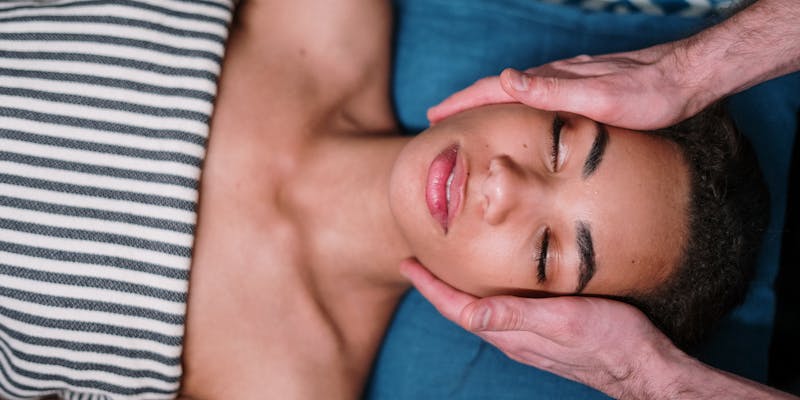Unwind and Heal: The Ultimate Guide to Massage Therapy
Are you feeling the weight of the world on your shoulders? In need of a moment to unwind and rejuvenate both your body and mind? Look no further as we delve into the realm of massage therapy, the ultimate guide to relaxation and healing. In this blog post, we will explore the myriad benefits of massage therapy for easing stress and promoting relaxation. From different massage techniques that cater to individual needs to how this ancient practice can enhance your overall well-being, we are here to guide you on a journey of self-care and tranquillity. Discover the transformative power of massage therapy and learn how to incorporate it into your wellness routine for a healthier, happier you

The Benefits of Massage Therapy for Relaxation and Stress Relief
Massage therapy offers a holistic approach to promoting relaxation and alleviating stress, making it an incredibly valuable tool for maintaining overall well-being. Through the skillful manipulation of soft tissues in the body, massage therapists can help release tension, reduce anxiety, and enhance the body's natural healing processes.
One of the key benefits of massage therapy is its ability to stimulate the release of endorphins, often referred to as the body's natural 'feel-good' chemicals. These endorphins act as natural painkillers and mood elevators, promoting a sense of well-being and relaxation. By helping to regulate stress hormones such as cortisol and adrenaline, massage therapy can also lower blood pressure and heart rate, creating a calming effect on both the body and mind.
Furthermore, regular massage sessions have been shown to improve sleep quality, which is crucial for overall health and stress management. By promoting relaxation and reducing muscular tension, massage therapy can help individuals achieve a deeper and more restful sleep, allowing the body to regenerate and heal more effectively.
In addition to its physiological benefits, massage therapy can also have a profound impact on mental well-being. The gentle touch and focused attention provided during a massage session can help individuals reconnect with their bodies, reduce mental clutter, and promote a sense of mindfulness. This can be especially beneficial for those struggling with anxiety or depression, as massage therapy offers a safe space for relaxation and self-care.
Overall, massage therapy is a powerful tool for combating the negative effects of stress and promoting relaxation. Whether you're looking to unwind after a long day at work, manage chronic pain, or simply enhance your overall well-being, incorporating regular massage sessions into your self-care routine can have a transformative impact on both your physical and mental health
Different Types of Massage Techniques for Healing and Well-being
Massage therapy is a holistic approach to healing and well-being that encompasses a variety of techniques tailored to address different physical and emotional needs. This ancient practice has been used for centuries to promote relaxation, reduce stress, alleviate muscle tension, improve circulation, and enhance overall health. Here are some of the different types of massage techniques commonly used in massage therapy:
1. Swedish Massage: This classic form of massage involves long, flowing strokes, kneading, and circular movements to relax the body and mind. It is effective in reducing muscle tension, promoting circulation, and inducing a state of deep relaxation.
2. Deep Tissue Massage: This type of massage targets the deeper layers of muscles and connective tissue to release chronic tension. It uses slow, firm pressure to help alleviate pain, improve mobility, and promote healing in specific areas of the body.
3. Sports Massage: Designed for athletes and individuals with active lifestyles, sports massage focuses on preventing and treating injuries, enhancing performance, and speeding up recovery. It incorporates stretching, deep tissue work, and targeted pressure techniques to improve flexibility, reduce muscle soreness, and promote overall well-being.
4. Hot Stone Massage: Hot stone massage involves the use of heated stones placed on specific areas of the body to promote relaxation and alleviate muscle tension. The warmth of the stones helps to improve circulation, relieve stress, and create a sense of balance and harmony.
5. Aromatherapy Massage: This type of massage combines the benefits of massage therapy with the use of essential oils extracted from plants to enhance physical and emotional well-being. Different oils are chosen based on their therapeutic properties to promote relaxation, reduce anxiety, uplift the mood, and alleviate various ailments.
6. Thai Massage: Originating from Thailand, Thai massage is a dynamic and interactive form of bodywork that combines acupressure, stretching, and yoga-like positions to improve flexibility, balance energy flow, and promote overall wellness. It is performed on a mat on the floor, with the recipient fully clothed.
Whether you are looking to relax, relieve pain, improve flexibility, or enhance your overall well-being, there is a massage technique suited to your needs. By exploring the different types of massage therapy and finding the one that resonates with you, you can embark on a journey of self-care, healing, and rejuvenation
How Massage Therapy Can Help Improve Physical and Mental Health
Massage therapy is a holistic approach to enhancing physical and mental well-being through the power of touch. Beyond just providing a luxurious experience, regular massage sessions offer a myriad of benefits that contribute to a healthier body and mind.
From a physical perspective, massage therapy aids in reducing muscle tension, promoting relaxation, and improving circulation. By targeting specific muscle groups and applying varying pressure techniques, massage therapists can release built-up tension and help muscles recover from strain or injury. This not only leads to increased flexibility and range of motion but also alleviates aches and pains, improving overall physical function.
In terms of mental health, massage therapy can be a soothing balm for stress and anxiety. The human touch involved in massage releases feel-good hormones like serotonin and oxytocin, which help to reduce feelings of anxiety and depression. The relaxation experienced during a massage session can also calm the nervous system, promoting a sense of tranquility and mental clarity. Over time, regular massages can contribute to improved sleep quality, enhanced mood, and a decreased likelihood of experiencing chronic stress.
Furthermore, the impact of massage therapy extends beyond the physical and mental realms. It has been shown to boost the immune system by increasing the activity of white blood cells, thus aiding the body in fighting off illness and infection. The relaxation induced by massage can also have beneficial effects on the digestive system, helping to alleviate conditions such as irritable bowel syndrome and promoting better gut health.
In conclusion, massage therapy offers a holistic approach to improving both physical and mental well-being. By incorporating regular massage sessions into your self-care routine, you can experience the transformative benefits of this ancient healing practice, leading to a healthier, happier you

Finding the Right Massage Therapist for Your Wellness Journey
When embarking on your wellness journey through massage therapy, finding the right massage therapist is crucial for achieving the best outcomes. The relationship between a client and their massage therapist is one built on trust, communication, and understanding. Here are some factors to consider when selecting the perfect massage therapist to support you on your path to physical and mental well-being:
1. Qualifications and Experience:
Look for a massage therapist who is qualified and certified in various massage techniques. Experienced therapists not only have a deeper understanding of the human body but also possess the skills to address specific issues or preferences you may have.
2. Specialisations:
Different massage therapists may have specialisations in areas such as sports massage, deep tissue massage, aromatherapy, or prenatal massage. Consider your needs and goals for seeking massage therapy and find a therapist whose specialisation aligns with those objectives.
3. Communication Style:
Effective communication between you and your massage therapist is essential. A good therapist will listen attentively to your needs, concerns, and preferences, ensuring a tailored experience that meets your expectations. Likewise, feel free to provide feedback during and after the session to help customise your future treatments.
4. Personal Connection:
Feeling comfortable and at ease with your massage therapist is key to a successful therapeutic relationship. A good therapist will create a safe and welcoming environment, fostering trust and relaxation, which are essential for the healing process.
5. Reviews and Recommendations:
Check online reviews, testimonials, or ask for recommendations from friends or healthcare professionals. Hearing about others' positive experiences can give you confidence in selecting a massage therapist who is skilled, professional, and capable of meeting your needs.
By carefully considering these factors and choosing a massage therapist who resonates with you, you are more likely to experience the full benefits of massage therapy and make significant progress on your wellness journey. Remember, finding the right massage therapist is a significant step towards achieving relaxation, rejuvenation, and healing for both your body and mind
Incorporating Regular Massage Therapy into Your Self-Care Routine
Massage therapy is a powerful tool that can transform your self-care routine, promoting both relaxation and healing. By incorporating regular massages into your schedule, you are not just indulging in a luxury spa treatment but investing in your overall well-being.
Regular massage therapy sessions have numerous benefits that extend far beyond just relieving muscle tension. They can help to reduce stress and anxiety levels, promote better sleep quality, boost immunity, and enhance overall mental and physical health.
When you make massage therapy a consistent part of your self-care routine, you are prioritising your body's needs and giving yourself the care and attention you deserve. It's a time where you can truly unwind, let go of the day's stresses, and reconnect with yourself on a deeper level.
Incorporating regular massages into your self-care regimen doesn't have to be a luxury reserved for special occasions. Instead, it can become a vital part of maintaining your overall health and well-being. Whether you opt for Swedish massage, deep tissue massage, or aromatherapy massage, each session can be tailored to address your specific needs and preferences.
Remember, self-care isn't selfish; it's essential for maintaining a balanced and healthy lifestyle. So, why not treat yourself to the healing benefits of massage therapy and make it a regular practice in your self-care routine? Your mind, body, and soul will thank you for it
Conclusion
Experience the transformative power of massage therapy as a key tool in your wellness routine. In this ultimate guide, we've uncovered the myriad benefits of massage therapy for easing stress and promoting relaxation. From various techniques tailored to individual needs to the enhancement of overall well-being, this ancient practice offers a journey of self-care and tranquillity. Embrace the opportunity to rejuvenate your body and mind through massage therapy, and take a step towards a healthier, happier you. Incorporate this healing practice into your routine and feel the weight lifted off your shoulders as you unwind and heal